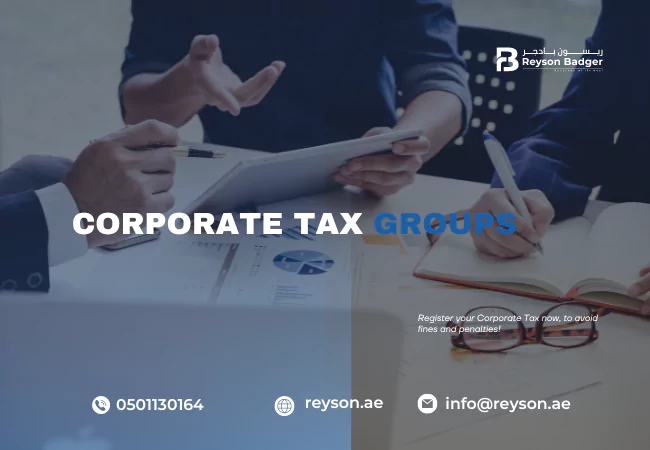
The implementation of the UAE's Corporate Tax regime introduced a significant concept for business groups: Tax Groups. These groups allow eligible companies to function as a single taxable entity, streamlining administration and potentially optimizing tax liabilities. But navigating the formation and operation of a UAE Corporate Tax Group under the new tax regulations can be complex This guide dives deep into the key aspects you need to understand.
The UAE introduced a corporate tax regime in June 2023, and it offers a unique benefit for groups of companies: the ability to form tax groups. This page explores the key features and advantages of this system, aiming to simplify corporate tax compliance for businesses in the UAE.

Tax groups allow a group of companies under common ownership to be treated as a single taxable entity for UAE corporate tax purposes. This simplifies compliance by consolidating the financial statements of the group and enabling the parent company to manage the tax affairs for the entire group.
Verify Eligibility: Ensure that the Parent Company and Subsidiaries meet the required conditions:
Submit an Application to the FTA: The Parent Company and each Subsidiary jointly apply to the Federal Tax Authority (FTA) to form a Tax Group.
FTA Review and Approval: The FTA will review the application to ensure conditions are met.
Tax Group Formation: In the event of acceptance of this application, the Tax Group shall be established on the date referred to in the nominated Tax Period. However, the FTA may vary the date.
On approval of the Tax Group: There will be the issuance of a separate Tax Registration Number for the entire Tax Group, and individual Tax Registration Numbers would also be needed for every member.
In the UAE, a tax group allows two or more resident companies to combine their tax reporting as one entity. Under Article 40 of the Corporate Tax Law, this setup simplifies compliance by letting the group file a single Corporate Tax (CT) return covering all its members.
The Ministry of Finance (MoF) has outlined the process for forming a tax group. Here are the key steps:
Eligibility Requirements:
Submission of Notice:
For further information, please refer to "UAE CORPORATE TAX GROUPS: PROS AND CONS YOU SHOULD KNOW" Blog.
The UAE's corporate tax regime offers tax groups as a valuable tool for simplifying compliance and optimizing tax liabilities for businesses operating under common ownership. By understanding the eligibility requirements, formation process, and benefits, companies can leverage this option to streamline their tax obligations in the UAE.
The concept of joint and several liability for corporate tax within a Tax Group can seem daunting. Let's explore the implications:
When the Tax Group is operational, the Parent Company is supposed to submit consolidated financial statements, applying IFRS or IFRS for SMEs. Moreover, the entire group's tax return shall be submitted within 9 months from the end of the Tax Period. Additionally, it will ensure that the Corporate Tax is paid on behalf of the Tax Group at the due date. Also, the Parent Company can claim tax repayments if all the requirements are satisfied.
The Tax Group is treated as a single taxable entity, with the Parent Company handling all tax-related matters. If Corporate Tax is not paid or paid late, penalties can be charged to the entire group and all members are jointly liable for outstanding taxes or penalties.
All members of the Tax Group, including the Parent Company, must have a valid Tax Registration Number. If the Tax Group or any member ceases its business activities, the Parent Company must apply to the FTA for deregistration of the group.
If adding or removing a member, the Parent Company must submit a joint application to the FTA to reflect these changes in the Tax Group.
Losses from one group member may not always be used to offset profits from other members, limiting Tax Group benefits.
Joining or leaving a Tax Group can complicate mergers and acquisitions. Changes in the group’s structure might require adjustments to the companies' tax positions.
The Parent Company must prepare consolidated financial statements, which can increase compliance costs. This responsibility might limit the flexibility of other group members.
Only UAE residents and taxable entities can form a Tax Group. Foreign-owned subsidiaries or multinational groups may not qualify.
The AED 375,000 exemption limit applies to the entire group, not each member. This could disadvantage smaller companies with lower profits.
Businesses should carefully assess these factors before joining or forming a Tax Group.
Forming a Corporate Tax Group in the UAE presents a strategic opportunity for eligible business groups. It can streamline tax administration, potentially optimize tax liabilities, and enhance group financial management. However, careful consideration of the eligibility criteria, operational changes, and potential liability implications is essential. Consulting with tax advisors experienced in the UAE's Corporate Tax regime is highly recommended to ensure a smooth and successful group formation process. Reyson Badger assists companies in forming groups for Corporate Tax purposes in the UAE.
By understanding these key aspects, you can make informed decisions about whether forming a UAE Corporate Tax Group aligns with your business strategy and maximizes the benefits offered by the UAE's corporate tax framework.
1. What is a Corporate Tax Group in the UAE?
A Corporate Tax Group in the UAE enables companies with shared ownership to combine their tax reporting. All of it is taken care of by the parent company instead of submitting individual tax returns for each entity.
2. How is ownership determined for UAE Corporate Tax Group eligibility?
To qualify for forming a Corporate Tax Group, the parent company must own at least 95% of the shares and voting rights in the subsidiaries, ensuring control over the group’s tax matters.
3. Can a company exit or be removed from a Corporate Tax Group?
Yes, a company can exit the group if it no longer meets the requirements, such as when it turns into a Free Zone Person (QFZP) or does not satisfy the ownership limit. The company must be removed at the start of the next tax period.
4. Are there any drawbacks of implementing a Corporate Tax Group in the UAE?
This is a significant disadvantage in that all group members have to use the same accounting standards and financial year. This can limit flexibility, especially when restructuring or modifying the business.
Internal auditing provides an independent and objective assessment of an organization's internal controls, risk management processes, and governance procedures. It identifies areas for improvement, evaluates the effectiveness of internal controls, and provides recommendations to enhance overall performance and efficiency.
The frequency of internal audits depends on:
Internal audits are not always mandatory but are recommended as a governance and risk management best practice. Regulatory bodies and standards such as SOX, COSO, ISO, and IIA often require internal audits.
Internal audit identifies areas for improvement, while ISO audit provides a framework for implementing best practices, ensuring compliance, and driving continuous improvement in organizational processes and systems.
Internal audit firms provide internal audit services, including risk assessment, control evaluation, and process improvement, helping organisations achieve their objectives and ensure regulatory compliance.
Internal audit services can help organizations achieve ISO 9001 certification by conducting gap analyses, identifying areas for improvement, and ensuring compliance with Quality Management System (QMS) requirements. This enables organizations to demonstrate their commitment to quality and customer satisfaction.
Internal audit services play a critical role in maintaining ISO 27001 certification by conducting regular audits to ensure ongoing compliance with Information Security Management System (ISMS) requirements. This helps organizations identify and mitigate potential security risks, ensuring the confidentiality, integrity, and availability of sensitive data.
Reyson Badger's team of experienced professionals, tailored approach, and commitment to delivering exceptional results set them apart from other internal audit consulting services.